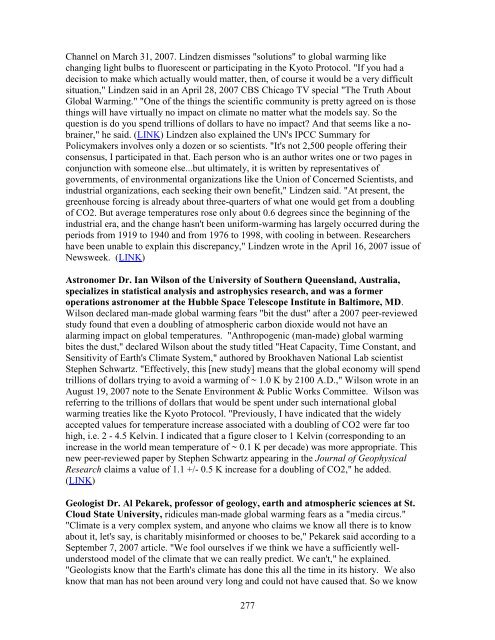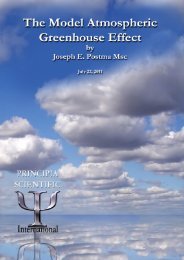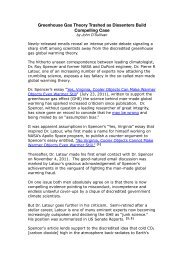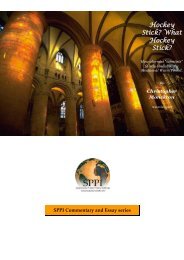Than 1000 International Scientists Dissent Over Man-Made Global ...
Than 1000 International Scientists Dissent Over Man-Made Global ...
Than 1000 International Scientists Dissent Over Man-Made Global ...
You also want an ePaper? Increase the reach of your titles
YUMPU automatically turns print PDFs into web optimized ePapers that Google loves.
Channel on March 31, 2007. Lindzen dismisses "solutions" to global warming like<br />
changing light bulbs to fluorescent or participating in the Kyoto Protocol. "If you had a<br />
decision to make which actually would matter, then, of course it would be a very difficult<br />
situation," Lindzen said in an April 28, 2007 CBS Chicago TV special "The Truth About<br />
<strong>Global</strong> Warming." "One of the things the scientific community is pretty agreed on is those<br />
things will have virtually no impact on climate no matter what the models say. So the<br />
question is do you spend trillions of dollars to have no impact? And that seems like a nobrainer,"<br />
he said. (LINK) Lindzen also explained the UN's IPCC Summary for<br />
Policymakers involves only a dozen or so scientists. "It's not 2,500 people offering their<br />
consensus, I participated in that. Each person who is an author writes one or two pages in<br />
conjunction with someone else...but ultimately, it is written by representatives of<br />
governments, of environmental organizations like the Union of Concerned <strong>Scientists</strong>, and<br />
industrial organizations, each seeking their own benefit," Lindzen said. "At present, the<br />
greenhouse forcing is already about three-quarters of what one would get from a doubling<br />
of CO2. But average temperatures rose only about 0.6 degrees since the beginning of the<br />
industrial era, and the change hasn't been uniform-warming has largely occurred during the<br />
periods from 1919 to 1940 and from 1976 to 1998, with cooling in between. Researchers<br />
have been unable to explain this discrepancy," Lindzen wrote in the April 16, 2007 issue of<br />
Newsweek. (LINK)<br />
Astronomer Dr. Ian Wilson of the University of Southern Queensland, Australia,<br />
specializes in statistical analysis and astrophysics research, and was a former<br />
operations astronomer at the Hubble Space Telescope Institute in Baltimore, MD.<br />
Wilson declared man-made global warming fears "bit the dust" after a 2007 peer-reviewed<br />
study found that even a doubling of atmospheric carbon dioxide would not have an<br />
alarming impact on global temperatures. "Anthropogenic (man-made) global warming<br />
bites the dust," declared Wilson about the study titled "Heat Capacity, Time Constant, and<br />
Sensitivity of Earth's Climate System," authored by Brookhaven National Lab scientist<br />
Stephen Schwartz. "Effectively, this [new study] means that the global economy will spend<br />
trillions of dollars trying to avoid a warming of ~ 1.0 K by 2100 A.D.," Wilson wrote in an<br />
August 19, 2007 note to the Senate Environment & Public Works Committee. Wilson was<br />
referring to the trillions of dollars that would be spent under such international global<br />
warming treaties like the Kyoto Protocol. "Previously, I have indicated that the widely<br />
accepted values for temperature increase associated with a doubling of CO2 were far too<br />
high, i.e. 2 - 4.5 Kelvin. I indicated that a figure closer to 1 Kelvin (corresponding to an<br />
increase in the world mean temperature of ~ 0.1 K per decade) was more appropriate. This<br />
new peer-reviewed paper by Stephen Schwartz appearing in the Journal of Geophysical<br />
Research claims a value of 1.1 +/- 0.5 K increase for a doubling of CO2," he added.<br />
(LINK)<br />
Geologist Dr. Al Pekarek, professor of geology, earth and atmospheric sciences at St.<br />
Cloud State University, ridicules man-made global warming fears as a "media circus."<br />
"Climate is a very complex system, and anyone who claims we know all there is to know<br />
about it, let's say, is charitably misinformed or chooses to be," Pekarek said according to a<br />
September 7, 2007 article. "We fool ourselves if we think we have a sufficiently wellunderstood<br />
model of the climate that we can really predict. We can't," he explained.<br />
"Geologists know that the Earth's climate has done this all the time in its history. We also<br />
know that man has not been around very long and could not have caused that. So we know<br />
277





